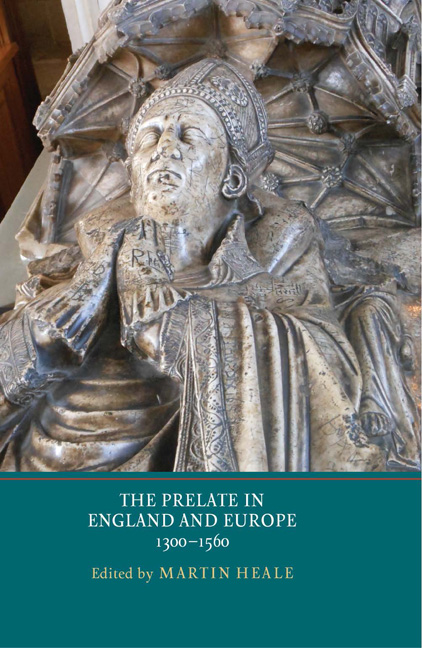Book contents
- Frontmatter
- CONTENTS
- List of Illustrations
- List of Contributors
- Preface and Acknowledgements
- List of Abbreviations
- Introduction
- Part I Prelates and Power
- Part II Patronage and Learning
- An Abbot and His Books in Late Medieval and Pre-Reformation England
- Prelates and the Provision of Books: Bishop John Carpenter's Carnary Library
- The Bishops and the Printers: Henry VII to Elizabeth
- Part III Identity and Display
- Part IV Attitudes towards Prelacy
- Index of People and Places
- Index of Subjects
- YORK MEDIEVAL PRESS: PUBLICATIONS
The Bishops and the Printers: Henry VII to Elizabeth
from Part II - Patronage and Learning
Published online by Cambridge University Press: 05 November 2014
- Frontmatter
- CONTENTS
- List of Illustrations
- List of Contributors
- Preface and Acknowledgements
- List of Abbreviations
- Introduction
- Part I Prelates and Power
- Part II Patronage and Learning
- An Abbot and His Books in Late Medieval and Pre-Reformation England
- Prelates and the Provision of Books: Bishop John Carpenter's Carnary Library
- The Bishops and the Printers: Henry VII to Elizabeth
- Part III Identity and Display
- Part IV Attitudes towards Prelacy
- Index of People and Places
- Index of Subjects
- YORK MEDIEVAL PRESS: PUBLICATIONS
Summary
The archbishop and his printer
Matthew Parker, Elizabeth's first archbishop of Canterbury, was in love with antiquities. He was also more than half in love with the political and cultural power of printing. Print offered him the possibilities of winning friends and influencing people, promoting the interests of the fledgling Church of England, and displaying his personal engagement with early British history. Elizabeth Evenden's study of John Day, the Protestant printer, has revealed how crucial it was for this erudite archbishop to have the resources of the press at his command. Their relationship evolved in the 1560s and was consolidated by Day's printing of Ælfric's A Testimonie of Antiquitie (1566 or 7) and his development of Anglo-Saxon characters for this and for William Lambarde's edition of early law codes, Archaionomia (1568). Parker financed the new font necessary to print these works, but it was Day whose technical skills ensured their effective presentation, the general accuracy of the print and hence much of the authority of these evidences from the distant national past. The success of these projects encouraged Parker to become a more active patron of the printer, explicitly deploying Day's books as artefacts in the struggle to win active support for the Protestant bishops.
- Type
- Chapter
- Information
- The Prelate in England and Europe, 1300–1560 , pp. 142 - 170Publisher: Boydell & BrewerPrint publication year: 2014



